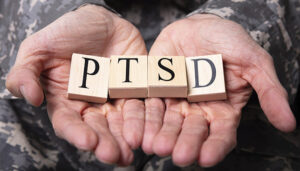PTSD can have a devastating impact on individuals who suffer from it. In this blog post, we will discuss some of the negative impacts that PTSD can have on people’s lives. The disorder can lead to depression, anxiety, and even suicide in some cases. It is important to seek help if you are struggling with PTSD. There are many treatments available that can help you manage your symptoms and improve your quality of life.
What Is PTSD? 
Post-traumatic stress disorder (PTSD), is formerly referred to as a severe condition that occurs after a person has witnessed a traumatic or frightening event.
Traumatic experiences that elicit intense dread, helplessness, or terror are known as traumatic events. Sexual or physical assault, the unexpected death of a loved one, an accident, war, or natural catastrophe are all examples of things that might induce PTSD. Families and first responders who respond to incidents may develop it as well.
Shock, anger, worry, fear, and even guilt are all typical reactions to a traumatic experience. These feelings are prevalent and normally go away over time. For someone who has PTSD, these sentiments persist and even grow stronger with time. People who have been exposed to trauma have symptoms that last longer than one month and aren’t able to function as well as before the incident that caused them.
Negative Impacts
Without treatment, the symptoms of posttraumatic stress disorder can have detrimental effects on the lives of children and adolescents. These effects will also most likely follow them into adulthood. Some examples of these negative effects can include:
Inability To Trust Others
PTSD can lead to a general feeling of mistrust. People with PTSD feel the inability to maintain positive, healthy interpersonal relationships. This is often because the individual has experienced a traumatic event that has led to them feeling like they cannot trust anyone. PTSD can also lead to paranoia and anxiety, which can make it difficult for someone to trust others.
It happens because the individual is constantly on edge and looking for signs that something bad is going to happen. Due to a lack of connection with others the individual may not want to be around people because they do not feel safe. This can all make it very difficult for someone with PTSD to form trusting relationships with others.
Feelings Of Fear, Worry, And Anxiety
PTSD can lead to chronic feelings of fear, worry, and anxiety. For example, someone with PTSD may avoid people or places that remind them of their trauma. They may also have trouble sleeping and may feel on edge all the time. These symptoms can make it hard to go about your everyday life. PTSD can also lead to substance abuse and depression. This can increase feelings of anxiety, guilt, and shame.
Increased Startle Reactions
PTSD can lead to startling reactions for several reasons. First, people with PTSD may constantly feel like they are in danger even when they are not. This can cause them to startle easily at any unexpected noise or movement. Second, people with PTSD may have trouble sleeping, which can leave them feeling exhausted and unable to focus. This can also make them more prone to startle reactions. Finally, people with PTSD may be taking medications that can increase their risk of startle reactions, such as antidepressants or anti-anxiety medications.
Low Self-Esteem
PTSD can lead to low self-esteem in many ways. One way is by causing the individual to avoid people and activities that they used to enjoy. This avoidance can be due to feeling like they are not good enough, or feeling ashamed of what has happened to them. Additionally, PTSD can cause individuals to feel constantly on alert, which can lead to feelings of exhaustion and irritability. These symptoms can make it difficult for those with PTSD to maintain healthy relationships and jobs.
PTSD can also cause individuals to have intrusive thoughts and flashbacks of the traumatic event. These thoughts can be very distressing and make it hard for individuals to focus on anything else. The constant reminder of the trauma can make individuals feel hopeless and helpless, which can lead to low self-esteem.
Living In Isolation 
PTSD can lead to social isolation in several ways. For example, people with PTSD may avoid social situations because they fear triggering their PTSD symptoms.
Additionally, such people may feel disconnected from others and unable to relate to them, which can make social interactions difficult. Finally, the shame and stigma associated with PTSD can also lead to social isolation. People with PTSD may feel like they are not worthy of love or friendship, or that no one could not possibly understand what they have been through. All of these factors can contribute to a person feeling isolated and alone.
Desire To Harm Oneself
PTSD can lead to self-harm in several ways. First, individuals with PTSD may engage in risky behaviors as a way of numbing their emotions or relieving their pain. This might include drug use, alcohol abuse, reckless driving, and other high-risk activities. Additionally, they may deliberately injure themselves as a form of self-punishment. They might feel that they deserve to be hurt because of the trauma they’ve experienced. Finally, some people with PTSD may attempt suicide as a way to escape their suffering.
Frequent Flashbacks
PTSD can cause people to experience flashbacks. A flashback is a sudden, intrusive, and often upsetting memory of a past event. Flashbacks can be so vivid and intense that people feel as if they are reliving the event. For example, a veteran with PTSD may have a flashback of being in combat. The veteran may smell the smoke, feel the heat of the explosion, and hear the sound of gunfire. The veteran may feel as if he or she is back in combat and danger.
Flashbacks can be triggered by anything that reminds the person of the traumatic event. For example, a sound, sight, or smell might trigger a war veteran’s flashback to combat. Flashbacks can be very distressing and make it hard for the person to function in day-to-day life.
Difficulty Concentration 
PTSD can lead to difficulty concentrating for several reasons. First, people with PTSD may have intrusive thoughts or memories that make it difficult to focus on anything else. Second, PTSD can cause hyperarousal, which makes it hard to relax and focus on tasks. Finally, medications used to treat PTSD can also cause side effects like fatigue or trouble sleeping, which can make concentration difficult.
Concentration power or the ability to focus can be significantly impacted by PTSD. It’s not uncommon for someone with PTSD to have trouble focusing on anything, whether it’s a conversation, a work project, or even just watching television. PTSD can cause problems with short-term memory as well as make it difficult to focus and pay attention. Following this implication, some people find it hard to function in their everyday lives.
Extreme Aggressiveness
PTSD can lead to aggression for several reasons. First, people with PTSD may be hypervigilant, or on constant alert for danger. This can lead to irritability and outbursts of anger. Second, people with PTSD may have difficulty regulating their emotions. This can cause them to feel overwhelmed by strong emotions like anger, fear, or sadness.
Finally, some people with PTSD turn to substance abuse as a way to self-medicate their symptoms. This can also lead to problems with impulsivity and aggression. For example, imagine that you are a veteran who has PTSD from your time in service. You come home from work one day to find your spouse in the kitchen talking on the phone.
Night Terrors
PTSD can lead to night terrors in some individuals. Night terrors are a type of sleep disorder that can cause individuals to wake up suddenly in a state of terror. Individuals may scream, thrash about, or have a racing heart rate and rapid breathing. In some cases, people may even act out violent behaviors during a night of terror. Night terrors are most common in children, but adults can experience them as well. PTSD is one of the many factors that can contribute to night terrors.
Treatments
There are solutions available to handle PTSD and overcome it gradually. Some useful solutions are explained below in detail:
Psychotherapy 
Psychotherapy, or “talk” therapy, is the most common form of treatment for people who have PTSD. Anybody with PTSD must be treated by a specialist in mental health to ensure optimum results. Some individuals with PTSD may need to try several therapies until they discover a treatment that works best for them.
Psychotherapy (often known as “talk therapy”) is the treatment of mental disorders using talk. One-on-one or in a group, psychotherapy can help you address issues that have been weighing on you for a long time. PTSD treatment typically lasts 6 to 12 weeks, but it may go on longer.
Many forms of psychotherapy can assist those who suffer from post-traumatic stress disorder. Some types of therapy address the symptoms of PTSD head-on. Depending on each individual’s requirements, the doctor or therapist may combine various therapies. The most common type of therapies used are
- Cognitive Behavioral Therapy
- Interpersonal psychotherapy
- Psychoanalytic Psychotherapy
- Dialectical behavior therapy
Other forms of therapy can also assist. With a therapist, people with PTSD should discuss all treatment choices. Individuals who have been diagnosed with PTSD should be taught the tools to control their symptoms and enable them to engage in pastimes they enjoyed before the condition developed.
CBT and other talk therapies help people learn how to respond to traumatic events that cause their PTSD symptoms. Various therapy techniques are used to help the patient in the following ways:
- Teach about trauma and how it affects you negatively.
- Relaxation and anger management skills are learned.
- Provide suggestions for better sleep, nutrition, and exercise habits.
- Assist in recognizing and coping with guilt, shame, and other emotions regarding the event
- Boosts concentration by changing your reactions to the symptoms of your PTSD. Therapy, for example, aids in facing reminders of the trauma.
Medications 
Antidepressants are the most researched form of therapy for post-traumatic stress disorder (PTSD). They can help minimize symptoms such as sadness, worry, anger, and lack of feeling inside. Other drugs might be used to treat certain PTSD symptoms, including sleeplessness and nightmares. Some examples of medications include Sertraline (Zoloft), Paroxetine (Paxil), Fluoxetine (Prozac), and Venlafaxine (Effexor).
Patients and physicians can collaborate to discover the finest treatment or drug combination for them, as well as the proper dose. It should be noted that prior consultation with your doctor is mandatory before you initiate the process of medications to relieve PTSD. Taking medications without a prior prescription by a doctor may result in harmful consequences.
Self Care Strategies 
It may be difficult to want to help oneself. However, it’s vital to remember that although progress may take some time, with treatment, you can get better. During your treatment, here are some self-care tips that can assist you:
- To assist decrease stress, engage in little physical activity or exercise.
- Make realistic objectives for yourself.
- Break up huge tasks into little ones, establish priorities, and do what you can.
- Take care of your health by eating a healthy and balanced diet.
- Spend time with other people and trust a good friend or family member to confide in. Discuss anything that might cause symptoms with others.
- Expect your symptoms to gradually get better, not all at once.
- Identify and seek out soothing circumstances, places, and people.
When a large number of individuals are at great risk of traumatic events (such as natural catastrophes, accidents, and violent actions), caring for oneself and others becomes especially essential.
Conclusion
The conclusion is that post-traumatic stress disorder (PTSD) symptoms can be severe and have a significant influence on PTSD patients’ lives. If you are experiencing any negative impact of PTSD, it is critical to be aware of them.
There should be no wait for PTSD therapy since it may make a significant difference in the long run. There are several resources at your disposal. The after-effects of PTSD can be extremely painful, but there is hope. If you or anyone you care about is suffering from PTSD, talk to a specialist right now. There are various options and therapies available that can make a tremendous difference. Do not suffer in silence, get help right now.
For more information, please contact MantraCare. PTSD or Post-Traumatic Stress Disorder is a mental health condition that affects people who have experienced or witnessed a traumatic event. If you have any queries regarding Online PTSD Counseling experienced therapists at MantraCare can help: Book a trial PTSD therapy session









